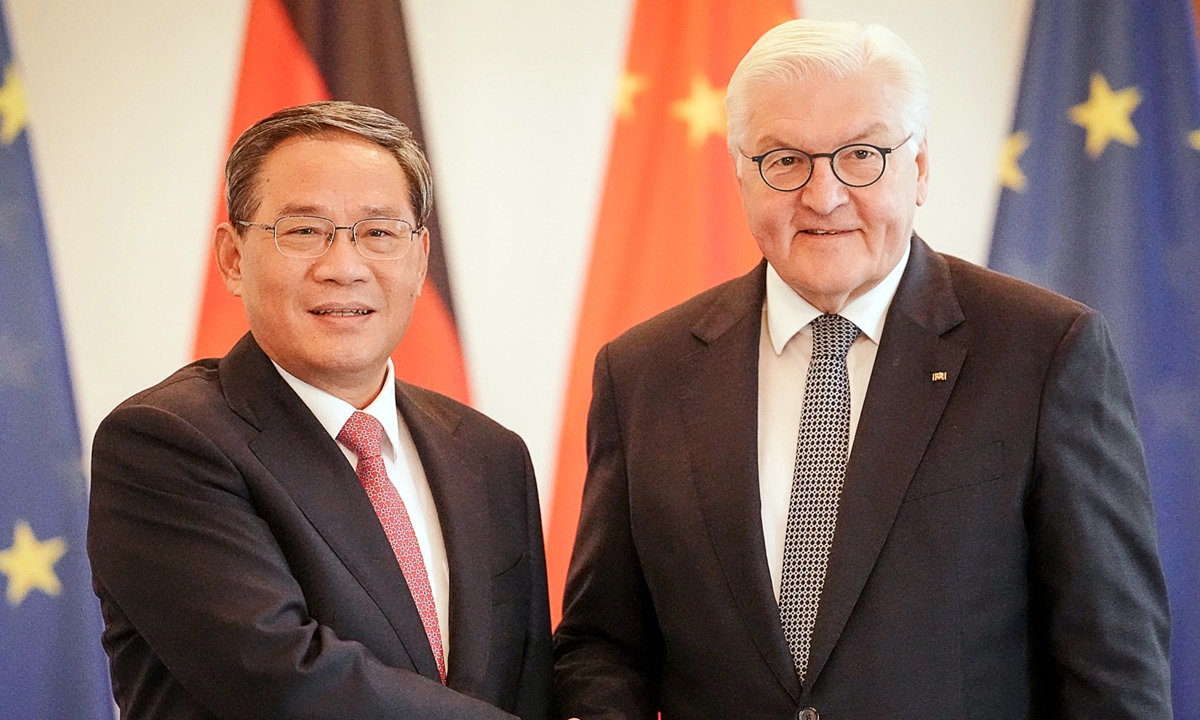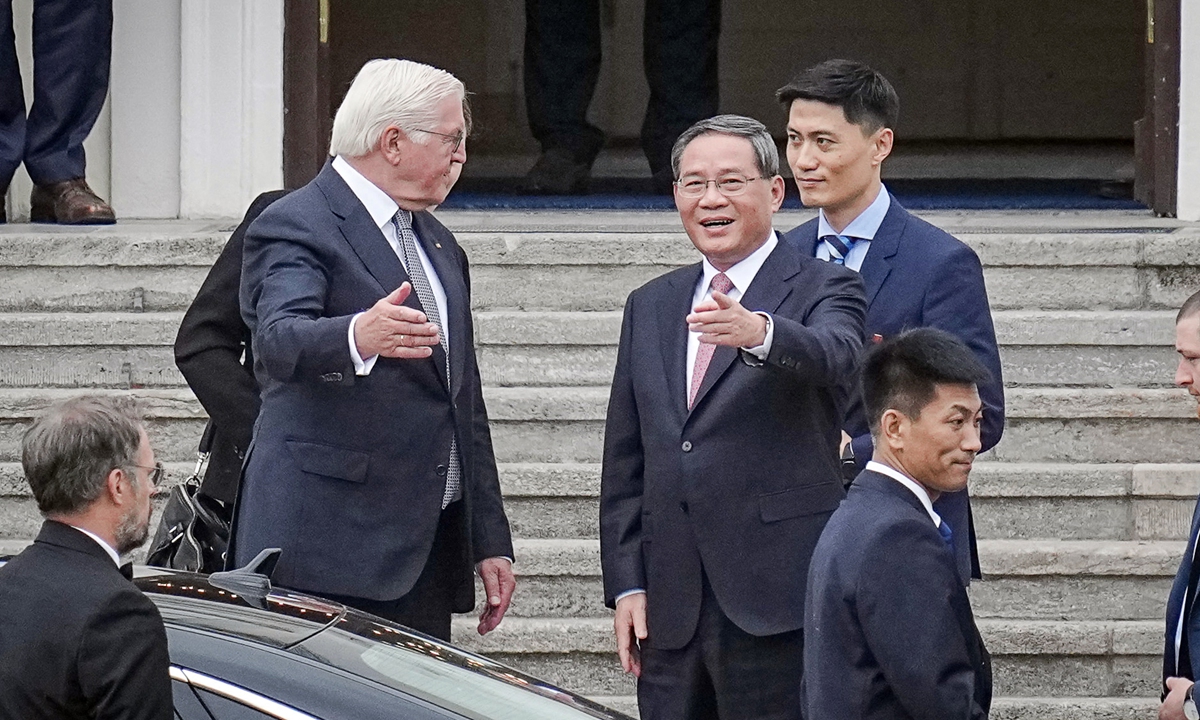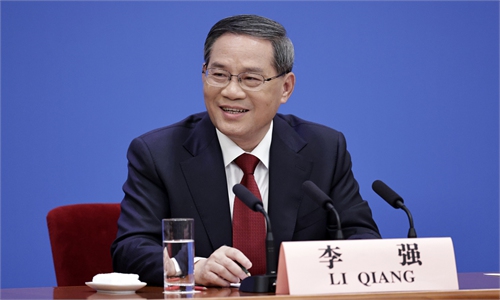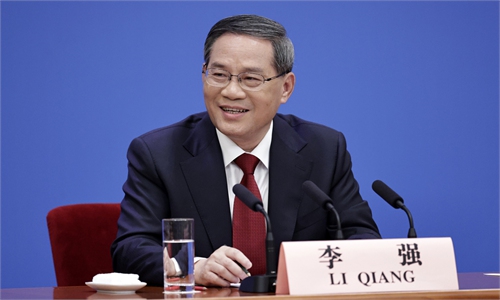Chinese premier's Germany visit to cement friendship and push for new devt in ties
Berlin seeks balance despite US pressure: expert

German President Frank-Walter Steinmeier (right) receives Li Qiang, Premier of China, at Bellevue Palace to kick off the Chinese government's visit to Germany on June 19, 2023. Photo: AFP
Chinese Premier Li Qiang arrived in Berlin, capital of Germany, on Sunday local time for an official visit, a trip that he believes will cement the two countries' traditional friendship and push for new development in bilateral ties.Experts said Li's first overseas trip since he became Chinese premier will allow Germany to face the future of bilateral ties more rationally based on the interests of both countries, and to avoid ideologizing all issues or compromising its strategic autonomy.
Upon his arrival, Li said that in recent years, the China-Germany relationship has seen steady progress, and bilateral cooperation has been continuously deepened and expanded, with new achievements being made in areas such as economy and trade, technologies, people-to-people and cultural exchanges, as well as green development.
China is ready to engage in frank and in-depth exchanges with Germany based on the principles of mutual respect, seeking common ground while reserving differences, and achieving mutual benefit and win-win outcomes, to further explore cooperation potential, properly handle differences, and enrich their all-round strategic partnership, Li said.
Li met with German President Frank-Walter Steinmeier at the presidential palace on Monday, and said China always attaches great importance to China-Germany relations, and that his visit to Germany and co-chairing the seventh China-Germany inter-governmental consultation with German Chancellor Olaf Scholz aim to implement the consensus reached by the two heads of state, continuously increase trust and clear doubts, explore new opportunities for bilateral cooperation, enrich the connotation of China-Germany all-round strategic partnership, and contribute to the development of both countries and global economic recovery.
Noting that there is no fundamental conflict of interests between China and Germany, and the two countries have a solid foundation for cooperation and a strong momentum for development, Li said China is full of confidence in the prospect of bilateral cooperation.
For his part, Steinmeier asked Li to convey his sincere regards to President Xi, saying that Germany is willing to be a trusted partner of China to jointly safeguard trade liberalization and meet challenges such as climate change.
He said that Germany opposes decoupling and any form of camp confrontation, and is willing to strengthen communication with China to make joint efforts to promote world peace and development.

German President Frank-Walter Steinmeier (left) bids farewell to visiting Chinese Premier Li Qiang (center right) in front of Bellevue Palace after their meeting in Berlin on June 19, 2023.The Chinese premier will also co-chair the seventh China-Germany inter-governmental consultation during the visit. Photo: VCG
Experts noted that Li's visit carries significant meaning upon the continuation of the high-level exchanges. It reflects the stability of bilateral relations and indicates strong mutual need as evidenced by such a quick resumption of communication in various fields after the COVID-19 pandemic.Scholz was the first European leader to visit China after the 20th CPC National Congress, and Li's return trip illustrates China's high regard for this relationship. "It shows that cooperation and communication remain the fundamental aspects of the China-Germany relationship," Cui Hongjian, director of the Department of European Studies at the China Institute of International Studies, told the Global Times on Monday.
The Chinese premier will also hold the seventh China-Germany inter-governmental consultation during the visit, which will be the first time the newly formed governments of the two countries communicate with each other in such an all-around fashion, Li said upon his arrival.
According to Reuters, the meeting will take place on Tuesday in the chancellery before Li and the Chinese ministers for trade and reform attend the China-Germany forum for economic and technological cooperation.
The consultation was postponed in previous years due to COVID-19, and this round of consultation will send a clear signal to the outside world that China-Germany high-level government exchanges are back to normal, and that the willingness from both sides to communicate remains strong, despite changes in the German government and pressure from the US, experts noted.
Li noted that the world today has entered a new period of turbulence and changes, and the more chaos and changes this world witnesses, the stronger the need should be advocated for the people of the two countries to carry forward their traditional friendship, enhance exchanges and cooperation, pool their wisdom, overcome challenges, and seize opportunities.
The meeting with China comes as Germany faces a "tricky balancing act" as it seeks to maintain good ties with its largest trading partner while also adhering to the Group of Seven (G7)'s commitment to "de-risk" from Beijing, Reuters reported on Thursday.
On Wednesday, Germany unveiled its first comprehensive national security strategy, which, although containing strong rhetoric against China, advocated cooperation and stressed that Germany is not seeking "decoupling" with the country, showing that Berlin is being pragmatic and cautious in dealing with China when faced with pressure from the US, analysts noted.
"Germany is seeking a delicate position between its own development interests, the benefits brought by partnership with China and the pressure exerted by the US; between its political stance and economic and trade needs; and lastly, between the interests of different parties and departments within the government," Cui explained.
But ultimately, experts believe Berlin will base its choices on its own interests, even if it sometimes has to appease the US and make concessions in terms of politics and values.
The Chinese premier's trip this time will also convey some important messages to Germany. "We will tell Berlin loud and clear that China is not a threat, as perceived by some, but a partner for seeking common cooperation, and our cooperation is based on mutual benefit and does not cater to one-sided interests," Sun Keqin, a research fellow at the China Institutes of Contemporary International Relations, told the Global Times on Monday.
"Furthermore, we must think through whether the world should move toward peace or a new cold war. Germany, as a country that relies heavily on international trade, will certainly not gain from the latter," Sun noted.
The two sides are likely to discuss deepening cooperation in green development as climate change is at the core of the two countries' development strategy, as well as new potential in seeking cooperation projects in Africa and Latin America, as these regions generally have closer ties with Beijing than with the West, the expert added.
"With the US intensifying its efforts to woo Europe, Li's trip allows both sides to face reality and the future more rationally and base that on the interests of the two countries," Sun said.


